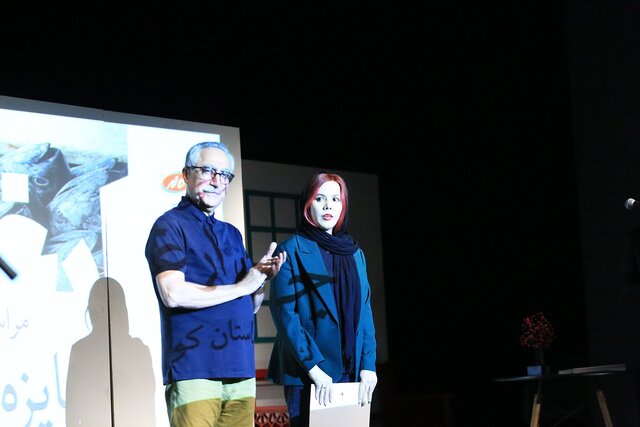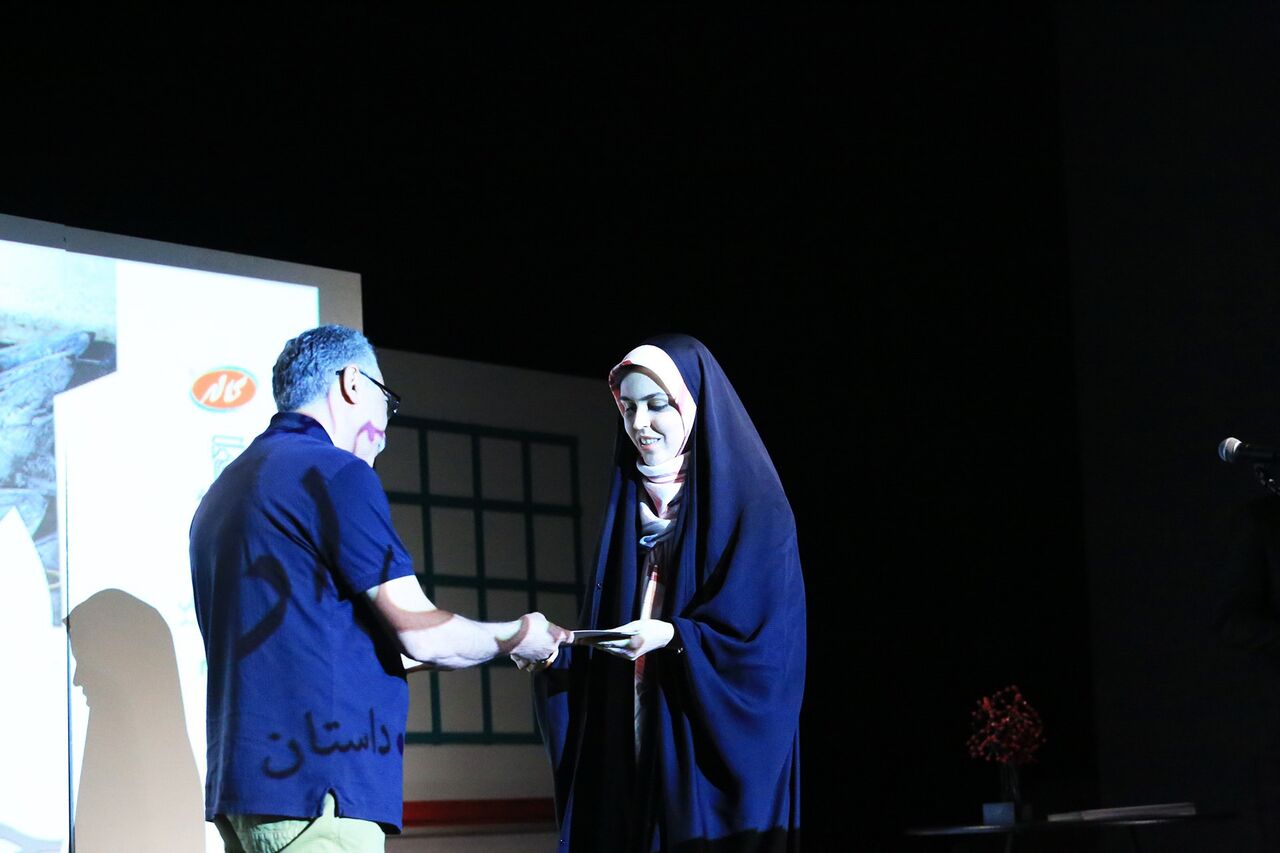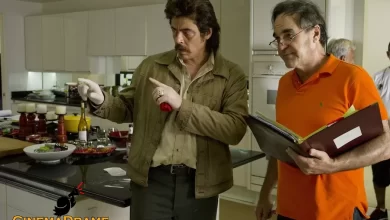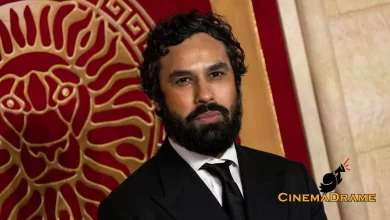The closing ceremony of the “Arghavan” Award in memory of Ebrahim Golestan
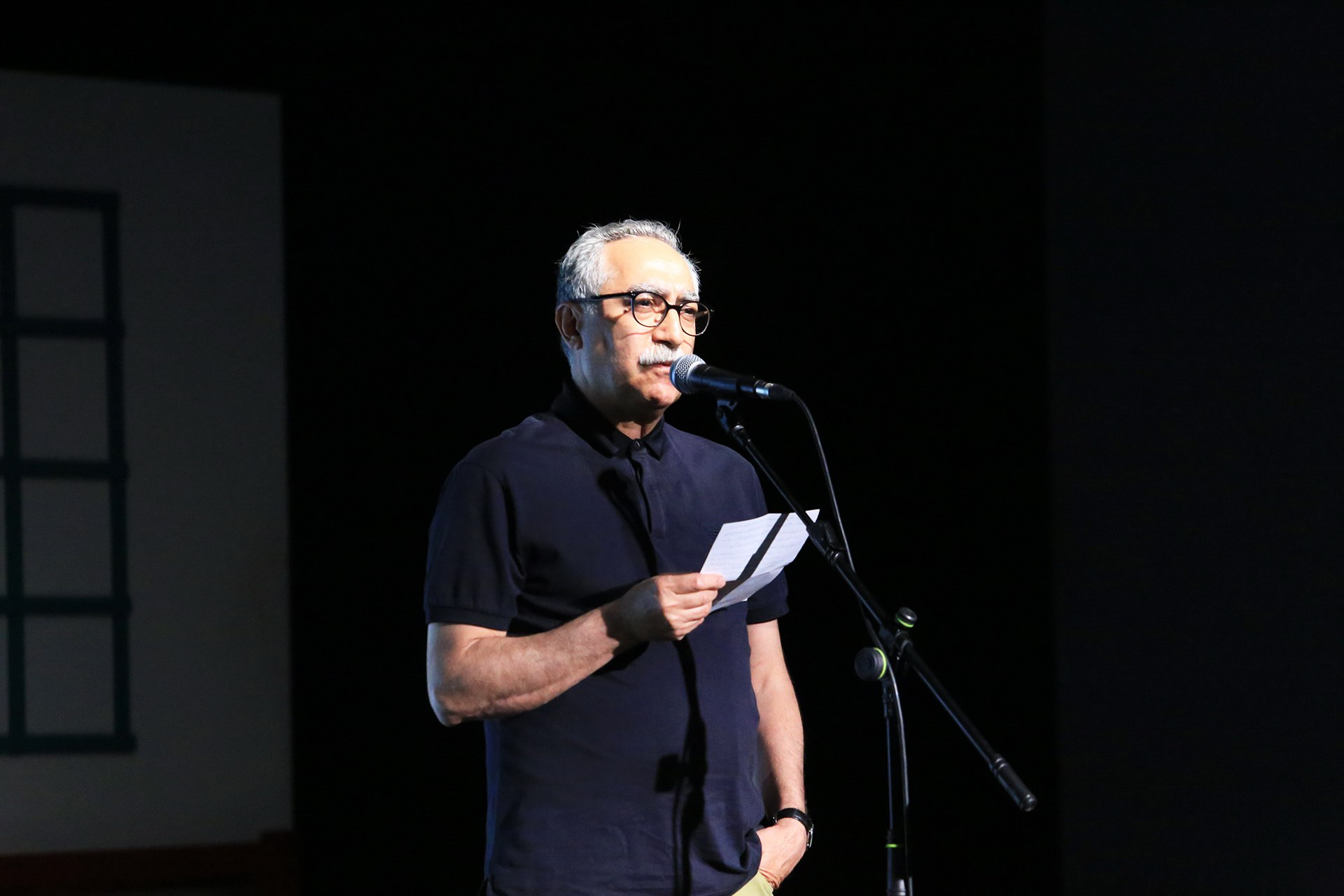
The sixth “Arghavan” Storytelling Award concluded by announcing the winners and paying tribute to Ebrahim Golestan and Reza Haddad.
According to cinemadrame, the final ceremony of this award took place on the evening of Saturday, June 16, at the Music and Theater Complex of Book Garden, starting with a welcoming speech by Ebrahim Haghighi, the secretary of the award. Masoud Frotan, who hosted the event, presented the report from the secretary about the organization of the sixth edition of this artistic event, which was held under the theme of “Doubt.”
Then, a note from the award’s secretary was read, followed by words from Ebrahim Haghighi, in memory of Reza Haddad, the theater director and the late manager of “Shabake Aftab,” who was one of the supporters of the Arghavan Award and passed away last year.
Ebrahim Haghighi, the head of the Arghavan Award’s Policy Council, spoke about Haddad: “It was planned for Mohammad Chermshir (a member of the Arghavan Award’s selection committee) to talk about Reza Haddad, but due to illness, he could not attend the event.”
He continued with a quote from Karim Emami (the late translator): “A long life makes us witness the sorrow of losing loved ones, and this is how we have seen the passing of friends like Kiumars Poorahmad, Attila Pessiani, Ahmadreza Ahmadi, and others. However, all of these friends shared a common trait; something akin to planting a sapling, nurturing young people, building a bridge over a river, and so on, which has allowed them to multiply in the hearts of all their admirers and continue to live on, never truly dying.”
Next, the previous winners of the Arghavan Award, who after being chosen in past editions have succeeded in independently publishing their books, were invited onto the stage by the event’s host. They shared insights about their success and how the award had boosted their confidence, enabling them to publish their books. They also offered words of encouragement to the young participants in this year’s edition and wished that the light of this award would shine for many years to come.
Good and Bad News of the Arghavan Award
Next, Farhad Tavakolidi, a representative of the award’s selection committee, provided an explanation about the works submitted to this edition.
He said: “We have one good news and one bad news. The bad news is that the number of stories submitted this year was fewer than in previous years, and we do not know the reason for that. The good news is that, unlike previous editions where part of the committee’s efforts were spent identifying stories among non-fiction and personal reflections, this year the stories had a higher quality level, which is an important point.”
The writer also expressed regret that some of the submitted stories contained spelling and grammatical errors and urged young writers to take greater responsibility for the Persian language and its writing rules.
Tavakolidi, emphasizing that he did not want to speak like a censor, added: “Unfortunately, some of the stories had a dark atmosphere, and although we have many difficulties, life also contains goodness and tenderness alongside the darkness, and we hope that these virtues will find their way into the stories of young writers.”
The names of the winners from tenth to fourth place were announced as follows, and they received their certificates of appreciation from Farhad Tavakolidi:
10th: Fatemeh Asgari (Hamadan)
9th: Yalda Yazdani (Shiraz)
8th: Najiba Firoozi (Afghanistan, residing in Semnan)
7th: Zeynab Mohammadbeigi (Tehran)
6th: Hanieh Reisi (Kerman)
5th: Pariya Dosti (Tehran)
4th: Zahra Shah Hosseini (Karaj)
The next part of the program was dedicated to honoring Ebrahim Golestan, and Aydin Aghdashloo, who appeared on stage, spoke about Golestan, saying: “A lifetime passed with ‘Golestan,’ and it’s hard to summarize it.”
Ebrahim Golestan was the pinnacle of creation!
Recalling a statement by Jalal Al Ahmad about Golestan, Aghdashloo added: “Jalal Al Ahmad said that he had never met anyone who considered himself to be the pinnacle of creation like Golestan, and Ebrahim Golestan truly was the pinnacle of creation because he knew a lot, read a lot, and worked a lot.”
Aghdashloo continued: “I spent a long life beside him and learned so much from him. When I think of him, many scenes come to my mind, such as the memory of the sturdy tree at his house, which he could never part with.”
The veteran artist emphasized Golestan’s important role in the culture and art of our country: “After Sadegh Hedayat, he was our greatest writer, a significant filmmaker, and a teacher, even though he never officially taught or mentored anyone. If he loved someone, he was kind to them. To truly understand him, one must set aside preconceptions because his bitter humor often led to misjudgments. I wish I had the opportunity to write memories about him, but I believe history will judge Golestan. Though, now, I no longer fully believe in the judgment of history.”
Next, Hossein Sanapur, representing the jury, presented a statement about the works in this edition of the award.
The state of reading books is not promising.
In part of this statement, he referred to the peak of Iranian storytelling and the growth of literary awards in the 1980s, adding: “We all know that the state of book reading is not particularly good. We know that the economic and political situation has left many book readers with neither money in their pockets nor the mood or time to read stories. This is why the situation of fictional books, especially Iranian stories, is not very good, or perhaps not good at all.”
Sanapur continued in his statement, expressing regret over the decline of storytelling and the decrease in literary awards and the diminishing of press reviews in the current era. He addressed young writers, saying: “If you give up storytelling tomorrow, we won’t be surprised, just as many writers in the past did the same due to various problems. However, there are others who, despite all the difficulties, continue to write because they know that writing is a path to freedom, freedom from all the bitterness, darkness, and emptiness that surrounds us.”
Then, in the presence of Leili Golestan, Sanapur, and Ahmad Poori, the jury presented the awards to the winners from third to first place as follows:
Third: Aida Roshdi (Tehran)
Second: Ali Malasalehi (Tehran)
First: Mahdeseh Norouzi (Isfahan)
The sixth edition of the award was held with the support of Kalleh Factories, Nashr Markaz, Avaye Nafas Studio, the “In/Ja” Institute, Shabake Aftab, Isam website, and the Music and Theater Complex of Book Garden.
